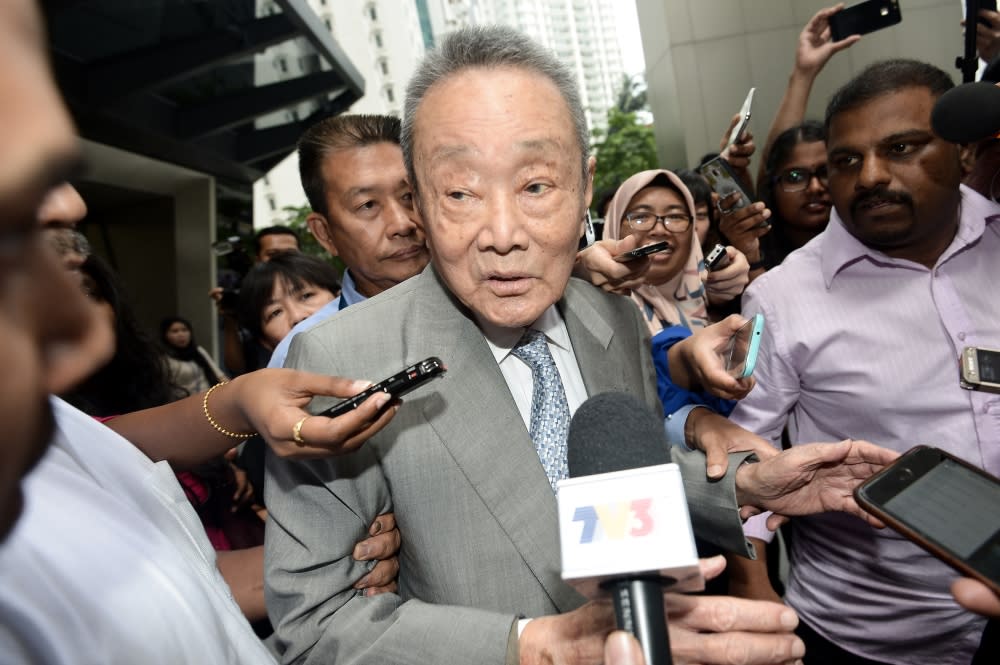Robert Kuok celebrates 100th birthday with Hong Kong elites

KUALA LUMPUR, Oct 6 — Robert Kuok, the Malaysia-born business magnate known for his remarkable business acumen and political influence, marked his 100th birthday today with a gathering of elite figures celebrating his lifetime achievements.
According to a report by the South China Morning Post, born in 1923 in Johor to Fujianese parents, Kuok belongs to a distinguished group of Asian entrepreneurs whose businesses evolved with the newly independent nations, rising from the shadows of wartime horrors and colonial injustice.
Kuok was congratulated by influential individuals including Hong Kong's wealthiest man, Li Ka-shing, 95, and his son Victor Li Tzar-kuoi, 59, who praised Kuok's friendship.
The Lee family of Henderson Land Group also extended warm wishes, recognising Kuok's visionary leadership.
“Your visionary leadership and remarkable contributions to the industry have left an incredible mark. Here’s to a century of achievements, good health, and continued happiness!” the company’s founder Lee Shau-kee, 95, and his sons Peter Lee Ka-kit, 60, and Martin Lee Ka-shing, 52 was quoted as saying.
South China Morning Post chairman Joe Tsai, a newspaper once owned by Kuok, also offered his best wishes and acknowledged Kuok's mentorship.
“Mr. Kuok has mentored me on being a good custodian of such an important Hong Kong institution as the South China Morning Post. I want to send my warmest congratulations to him on his 100th birthday,” Tsai was quoted as saying.
While Kuok has been a Hong Kong resident since the 1970s, his 2017 memoir revealed his enduring affection for Malaysia, despite his criticisms of the country's preferential treatment of the majority of Malays.
In 2018, he accepted a position on an advisory council to Malaysia's new multiracial government following the defeat of Umno back then.
Kuok, the youngest of three sons from a prosperous family, faced numerous challenges on his journey to corporate success, including taking over the family's rice distribution business after his father's death in 1948.
He overcame adversity, referring to his early struggles as “humiliation at the hands of the banks” that fuelled his determination to succeed.
“Now, if that doesn’t drive you forward in life to make as much money as possible so you can thumb your nose at those bankers, then what will?” he was quoted as saying by the news portal.
By the 1960s, he had diversified his business and earned the moniker “Sugar King of the East.”
Forbes currently estimates his wealth, spanning various industries, at US$10.3 billion (RM48.7 billion), making him Malaysia's richest individual and the world’s 155th richest person.
Kuok's Shangri-La Group, established in 1971, now boasts over 100 hotels and resorts in 78 destinations worldwide.
Kuok's significant political connections include his close relationships with leaders like the late Lee Kuan Yew and former prime minister Tun Dr Mahathir Mohamad.
Lee turned to Kuok for advice during the early years of his 31-year term as prime minister.
The news portal reported that when Lee passed away at the age of 91 in 2015, Kuok praised him as “the most outstanding Chinese figure outside of mainland China”.
Kuok's relationship with Dr Mahathir was characterised by deep mutual respect.
Dr Mahathir, a long-standing former member of Umno which governed Malaysia since its independence, left the party to join former rivals and secure victory in the 2018 election, running on an anti-corruption platform.
In the weeks following the election, Kuok met with Dr Mahathir in the prime minister's office, a moment captured by cameras.
During this meeting, Kuok paid tribute to the veteran politician and Dr Mahathir, who had appointed Kuok to his council of advisers, said that he required his help.
In China, Kuok's vast commercial interests have thrived due to his longstanding ties with Beijing, dating back to his early business ventures trading rice and sugar.
In 1993, China appointed him as an adviser ahead of the 1997 sovereignty handover.
He also acquired the South China Morning Post, a Hong Kong newspaper, advocating for freedom of the press in that country.
Kuok's contributions to China's development were substantial, including the China World Trade Center, a significant foreign investment in Beijing's Chaoyang business district, which opened in 1990.
He considered it one of the best investments in China, a move that boosted his reputation and goodwill in the country.
Despite his success and global ventures, Kuok's love for Malaysia remained unwavering.



